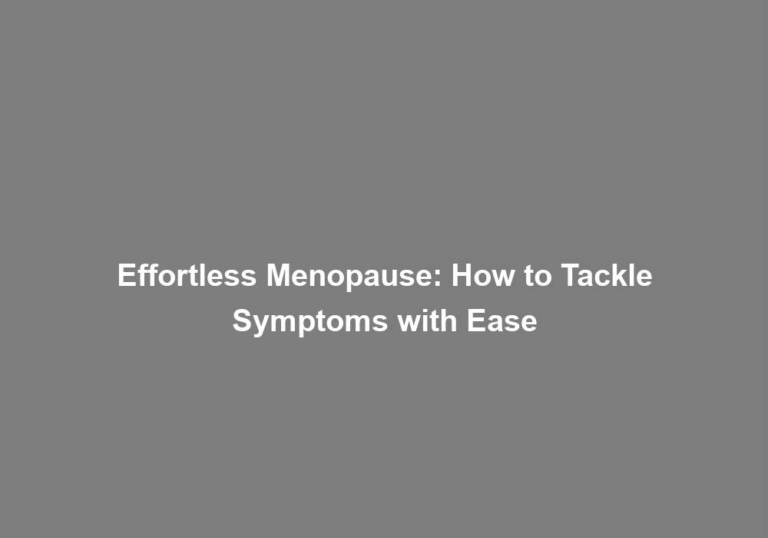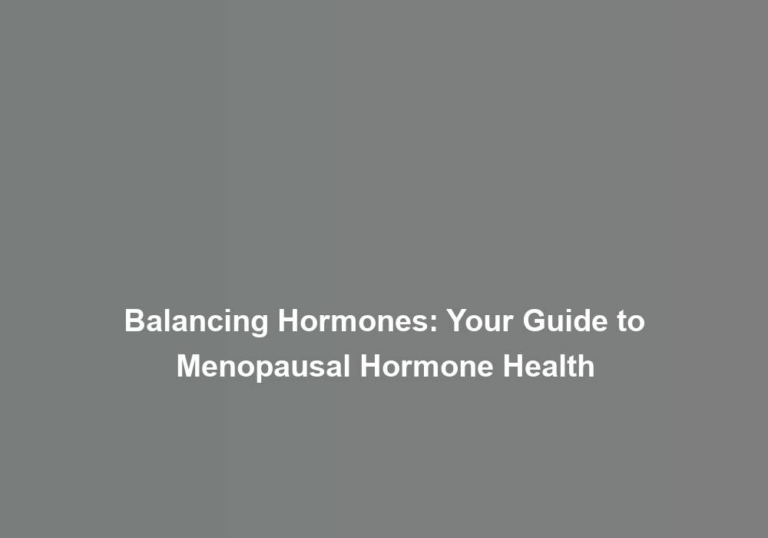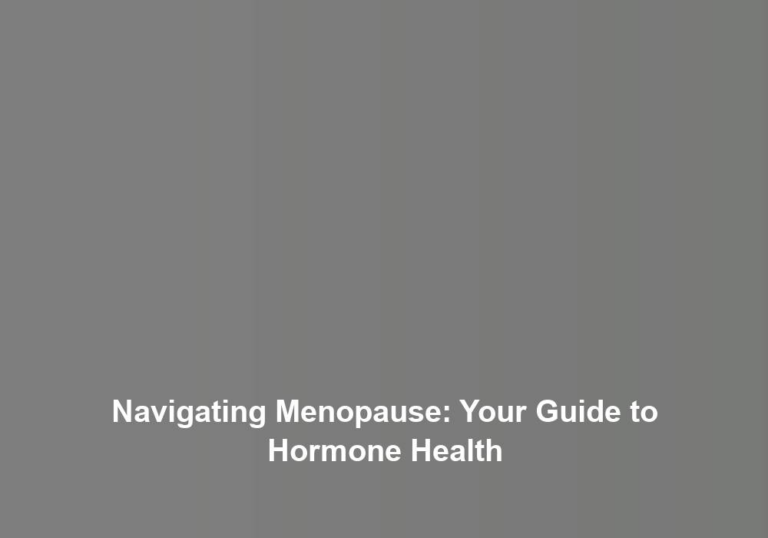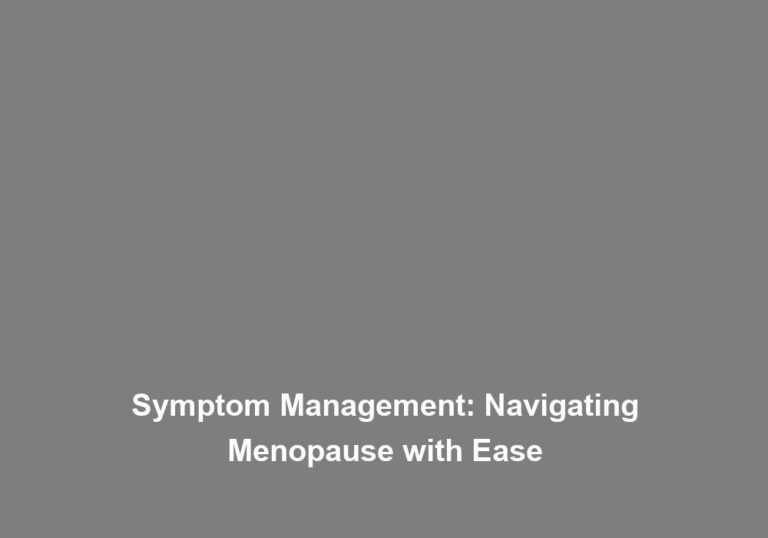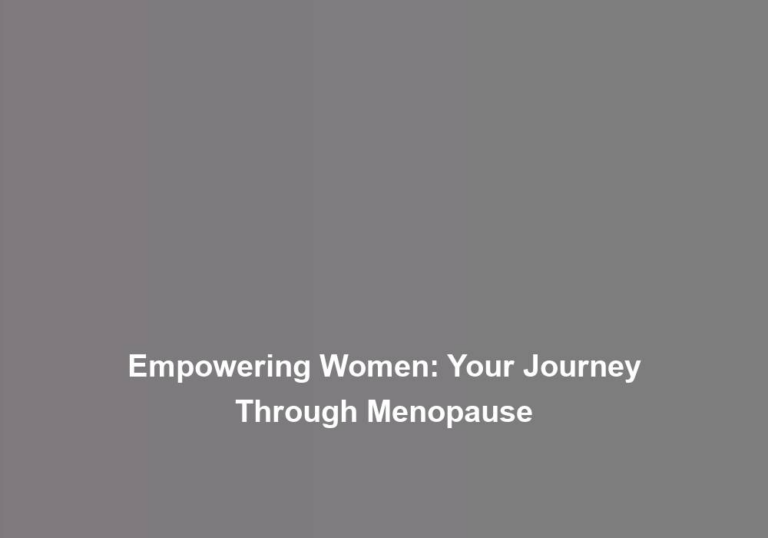Empowering Menopause: Strategies for Symptom Management
Navigating the transition into menopause can feel like a balancing act. On one hand, you may be experiencing bothersome symptoms like hot flashes, mood swings, and sleep disturbances. On the other hand, youG??re seeking effective strategies to manage these symptoms and reclaim a sense of control over your well-being. As you explore the various approaches to empowering menopause, youG??ll discover valuable insights and practical techniques that can help you navigate this phase of life with confidence and resilience.
Understanding Menopause Symptoms
Understanding menopause symptoms can be challenging due to the wide range of physical and emotional changes that occur. One of the key aspects of navigating menopause is understanding the hormone changes that are taking place in your body. Estrogen levels fluctuate, leading to a variety of symptoms such as hot flashes, night sweats, and vaginal dryness. These hormonal shifts can also impact your emotional well-being, causing mood swings, irritability, and feelings of anxiety or sadness. ItG??s important to recognize that these emotional fluctuations are a normal part of the menopausal transition, and seeking support from friends, family, or a mental health professional can be beneficial.
Managing emotional fluctuations during menopause requires a multi-faceted approach. Engaging in regular physical activity can help regulate mood and reduce stress. Additionally, practicing relaxation techniques such as deep breathing, meditation, or yoga can provide emotional relief. Prioritizing self-care and carving out time for activities that bring you joy and relaxation can also contribute to managing emotional symptoms. ItG??s essential to communicate openly with your healthcare provider about your emotional well-being, as they can offer guidance and support, which may include therapy or medication if necessary.
Lifestyle Adjustments for Symptom Relief
Navigating menopause symptoms can be effectively supported through lifestyle adjustments that promote symptom relief and overall well-being. Mindfulness practices and stress management are crucial components of this journey. Mindfulness, which involves being fully present and aware of your thoughts and feelings, can help ease the emotional and psychological symptoms often associated with menopause. Engaging in mindfulness practices, such as meditation or deep breathing exercises, can provide a sense of calm and reduce anxiety and irritability.
Stress management is equally important in alleviating menopausal symptoms. Chronic stress can exacerbate hot flashes, night sweats, and mood swings. Finding healthy ways to manage stress, such as regular exercise, adequate sleep, and relaxation techniques, can significantly improve your overall well-being during this time of transition. Additionally, incorporating stress-reducing activities into your daily routine, such as yoga or tai chi, can help regulate hormonal fluctuations and promote a sense of balance.
Incorporating mindfulness practices and stress management techniques into your lifestyle can have a profound impact on how you experience menopause. By nurturing your mental and emotional well-being, you can navigate this change with greater ease and resilience. Remember that these adjustments are not only about managing symptoms but also about embracing a holistic approach to your health and finding a sense of belonging and peace during this transformative phase of life.
Dietary Strategies for Hormonal Balance
To maintain hormonal balance during menopause, consider incorporating nutrient-rich foods into your diet to support your overall well-being. Hormone balancing foods play a crucial role in managing menopausal symptoms. Opt for foods rich in phytoestrogens such as soy products, flaxseeds, and legumes, as these can help mimic the effects of estrogen in the body and alleviate symptoms like hot flashes and vaginal dryness. Additionally, including plenty of fruits and vegetables in your diet provides essential vitamins, minerals, and antioxidants that support overall hormonal health.
Incorporating nutritional supplements can also aid in managing hormonal fluctuations during menopause. Omega-3 fatty acids, found in fatty fish like salmon, as well as in flaxseeds and chia seeds, can help reduce inflammation and support hormone production. Vitamin D is essential for bone health and may also play a role in hormonal balance. Consider adding a vitamin D supplement to your routine, especially if you have limited sun exposure. Calcium and magnesium are important for bone health and muscle function, both of which can be affected during menopause. Including a supplement or consuming foods rich in these nutrients, such as dairy products and leafy greens, can help support your body through this transition.
Exploring Alternative Therapies
Consider exploring alternative therapies to complement your menopause symptom management, providing additional relief and support. Herbal remedies, acupuncture, and acupressure are alternative approaches that have been used for centuries to alleviate menopausal symptoms. These therapies can be used alongside other treatments to enhance your overall well-being during this transition.
| Therapy Type | Description | Benefits |
|---|---|---|
| Herbal Remedies | Herbal remedies involve the use of plants or plant extracts to alleviate symptoms such as hot flashes and mood swings. | May provide relief from menopausal symptoms without the side effects of conventional medications. |
| Acupuncture | Acupuncture is a traditional Chinese practice that involves inserting thin needles into specific points on the body to alleviate symptoms. | Can help reduce hot flashes, improve sleep, and alleviate mood swings. |
| Acupressure | Acupressure is similar to acupuncture but involves applying pressure to specific points on the body using hands, fingers, or special devices. | May help reduce the frequency and severity of hot flashes and improve overall well-being. |
When considering alternative therapies, itG??s important to consult with a qualified healthcare provider to ensure these approaches are safe and suitable for you. Additionally, these therapies are not meant to replace conventional medical treatments but can be used as complementary strategies. By exploring alternative therapies like herbal remedies, acupuncture, and acupressure, you can empower yourself to find relief from menopausal symptoms and enhance your overall quality of life.
Medical Interventions and Treatments
Now, letG??s talk about medical interventions and treatments for managing menopause symptoms. You have options such as hormone replacement therapy, non-hormonal medications, and lifestyle and dietary changes to help alleviate your symptoms. These interventions can play a crucial role in managing your menopausal symptoms and improving your overall quality of life.
Hormone Replacement Therapy
When addressing menopause symptoms, hormone replacement therapy can be a viable option for managing the associated challenges. It involves the use of medications containing female hormones to replace the ones the body no longer produces in adequate amounts. HereG??s what you need to know:
- Hormonal regulation: Hormone replacement therapy helps regulate hormonal levels, particularly estrogen and progesterone, which decline during menopause.
- Symptom relief: It can alleviate various menopausal symptoms such as hot flashes, night sweats, vaginal dryness, and mood swings.
- Types of therapy: Options include estrogen therapy (ET) for women who have had a hysterectomy, and combined estrogen-progestin therapy (EPT) for those with an intact uterus.
- Risks and benefits: While it can effectively manage symptoms, hormone replacement therapy also carries certain risks, so itG??s crucial to weigh the potential benefits against the risks with your healthcare provider.
Non-Hormonal Medications
To manage menopausal symptoms, non-hormonal medications offer alternative medical interventions and treatments that can effectively alleviate discomfort and improve quality of life. Natural remedies and herbal supplements are gaining attention for their potential in managing menopausal symptoms. Black cohosh, for example, has been studied for its potential in reducing hot flashes and night sweats. Additionally, evening primrose oil is believed to help alleviate symptoms such as breast tenderness and mood swings. Some women find relief from menopausal symptoms by using dong quai, which is thought to have estrogen-like effects in the body. However, itG??s crucial to consult with a healthcare provider before starting any herbal supplements to ensure safety and effectiveness, as they can interact with other medications or have adverse effects. Always seek professional guidance for the best approach to managing menopausal symptoms.
Lifestyle and Dietary Changes
Consider making lifestyle and dietary changes as part of your medical interventions and treatments for managing menopausal symptoms. Making mindful eating choices and incorporating stress management techniques can greatly impact how you experience menopause. Here are some strategies to consider:
-
Mindful Eating: Pay attention to your bodyG??s hunger and fullness cues. Choose nutrient-dense foods that support hormonal balance and overall well-being.
-
Stress Management: Incorporate relaxation techniques such as deep breathing, meditation, or yoga to reduce stress levels and improve overall mental and emotional well-being.
-
Physical Activity: Engage in regular exercise to support overall health and well-being, and to help manage weight and reduce the impact of menopausal symptoms.
-
Hydration: Ensure you are adequately hydrated by drinking plenty of water throughout the day to support overall health and minimize symptoms.
Building a Supportive Menopause Plan
When managing menopause symptoms, itG??s important to consider supportive lifestyle changes that can help alleviate discomfort. A holistic wellness approach, including nutrition and exercise, can also play a significant role in managing symptoms. Building a personalized support network of friends, family, and healthcare professionals can provide the encouragement and understanding you need during this transition.
Supportive Lifestyle Changes
Making supportive lifestyle changes is essential for building a comprehensive and effective menopause management plan. By prioritizing mindfulness practices and stress reduction, you can create a supportive environment that eases menopausal symptoms and promotes overall well-being. Here are four lifestyle changes to consider:
-
Regular Exercise: Engage in activities you enjoy, such as walking, yoga, or swimming, to reduce stress and improve mood.
-
Balanced Nutrition: Incorporate a variety of fruits, vegetables, whole grains, and lean proteins into your diet to support overall health and manage weight fluctuations.
-
Adequate Sleep: Establish a relaxing bedtime routine and create a comfortable sleep environment to promote better sleep quality.
-
Social Support: Surround yourself with understanding and supportive individuals, whether itG??s friends, family, or a menopause support group, to share experiences and gain a sense of belonging.
Holistic Wellness Approach
To build a comprehensive and effective menopause management plan, prioritize a holistic wellness approach that integrates physical, emotional, and mental well-being for optimal symptom relief and overall health. By focusing on mind-body connection and incorporating natural remedies, you can address menopausal symptoms in a more balanced and sustainable manner. Consider adopting practices such as yoga, meditation, and deep breathing exercises to promote emotional well-being and reduce stress. Additionally, herbal supplements like black cohosh and evening primrose oil may offer relief from hot flashes and mood swings. Embracing a holistic approach empowers you to take charge of your well-being, fostering a sense of belonging within your own body. Below is a table highlighting some holistic wellness strategies for managing menopausal symptoms:
| Mind-Body Practices | Natural Remedies |
|---|---|
| Yoga | Black Cohosh |
| Meditation | Evening Primrose Oil |
| Deep Breathing Exercises | Herbal Supplements |
Personalized Support Network
Consider creating a personalized support network to help you navigate and manage the challenges of menopause effectively. Building a strong support system can make a significant difference in how you experience this phase of life. Here are some essential components to include in your personalized support network:
- Emotional Support: Seek out friends, family members, or support groups who can provide understanding, empathy, and encouragement during this transitional period.
- Peer Counseling: Connect with other women going through menopause to share experiences, advice, and coping strategies. Peer support can be especially valuable in normalizing your experiences and providing practical tips.
- Healthcare Providers: Cultivate a strong relationship with healthcare professionals who understand menopause and can offer medical guidance and treatments tailored to your needs.
- Self-Care Activities: Incorporate self-care practices such as yoga, meditation, or hobbies that bring you joy and relaxation into your support network to nurture your overall well-being.
Conclusion
In conclusion, managing menopause symptoms is crucial for womenG??s overall well-being. Did you know that 75% of women experience hot flashes during menopause? By making lifestyle adjustments, incorporating dietary strategies, exploring alternative therapies, and seeking medical interventions, you can empower yourself to effectively manage your menopause symptoms. Remember, building a supportive menopause plan is key to living a fulfilling and healthy life during this transitional phase.



